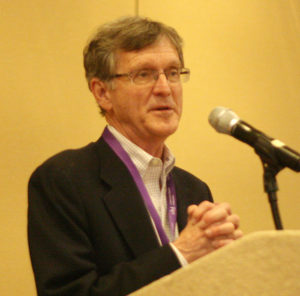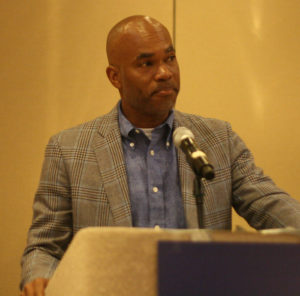Baptists no longer have the luxury in today’s culture of ministering to their communities in silos separated by race, Baptist historian Bill Leonard said June 23 at a New Baptist Covenant luncheon at the Cooperative Baptist Fellowship General Assembly in Greensboro, N.C.

Bill Leonard
“It’s too late in the denominational game for all us not to find ways to do shared ministries as congregations,” the white professor of Baptist studies and church history at Wake Forest Divinity School said in a dialogue on racial justice and the church with African-American pastor Darryl Aaron.
“When I used to go and talk about the changes in American religious life, African-American pastors would often say, ‘Well, that’s happening in the white church, but it’s not happening now,’” Leonard said. “In 2016 black pastors finish my sentences for me.”

Darryl Aaron
Aaron, pastor of The Providence Baptist Church in Greensboro, urged caution about the view that the only solution to segregation on Sunday morning is integrated churches.
“The black church, we’ve always owned it,” Aaron said. “As African-Americans, we haven’t owned a whole lot of stuff. We own that, and it’s sacred to us.”
“When Travon Martin dies on Wednesday, I’m not sure if all African-Americans are ready to sit beside Zimmerman on Sunday,” Aaron continued. “The gospel is telling us to forgive. I’ve got to trust who is telling me to forgive.”
“I know there is no east and west, no north and south in Christ, but I do believe a lot of healing has to take place,” Aaron said.
Aaron said he is no fan of “Kum bah Yah” gatherings where people of different races come together in joint services that are more about aesthetics than genuine unity.
“We come together around the gospel,” Aaron said. “I think we can come together even on Sunday morning, but we must realize it’s not about aesthetics but is about interpretation and the lens we look through to see the text and see where God is taking us.”
Leonard said black and white churches “have to be intentional about ways in which they can participate together in shared ministry and in common conversation.”
“I think that’s why an organization like the New Baptist Covenant is so essential,” Leonard said. “We have to get off of ground zero to get more involved.”
